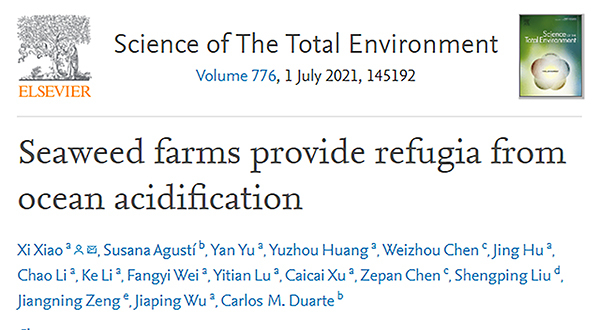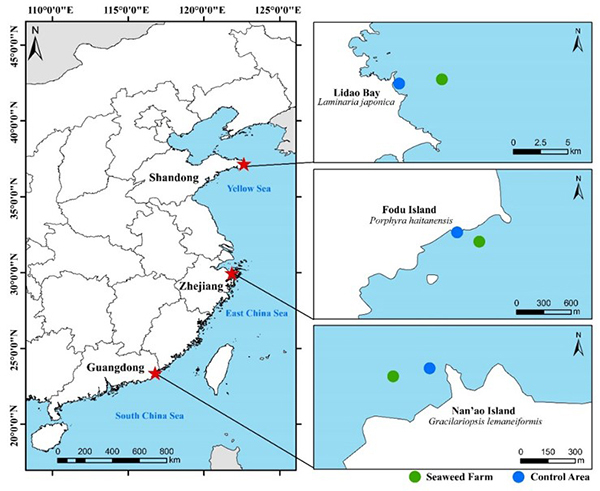NEWS
Zhejiang University's Department of Marine Sciences has achieved new results in blue carbon research
The blue carbon research team of the Ocean College of Zhejiang University has made new progress in the mitigation mechanism of large-scale seaweed farming to climate change. The academic paper entitled Seaweed farms provide refugia from ocean acidification, written by Associate Professor Xiao Xi, from the Department of Marine Science, Ocean College as the first author, and Professor Wu Jiaping as co-author, was published in Science of the Total Environment, which is an important academic journal in the field of Marine Chemistry and Environment.

Blue Carbon refers to the carbon fixed and stored in ocean by activity of marine organisms to absorb carbon dioxide from the atmosphere. Seaweeds are considered to be an important blue carbon resource, but their ability and mechanisms to mitigate climate change are still unclear. China produces about 70% of the world's cultured seaweeds. Therefore, promoting the scientific research and technological innovation of blue carbon through large-scale seaweed aquaculture will provide an important and unique support for the achievement of China’s 2060 Carbon Neutral goal.

As the ocean absorbs excess carbon dioxide in the atmosphere, sea water is gradually becoming acidic. Since the industrial revolution, the pH of seawater has already dropped by 0.1 unit. The ocean acidification will change the various balances of seawater chemistry, and pose a great threat to a variety of marine organisms and even ecosystems that depend on the stability of the marine chemical environment. Associate Professor Xiao Xi and graduate students Yu Yan, Huang Yuzhou and Hu Jing et.al. of Zhejiang University, together with scientists from the King Abdullah University (KAUST), Shantou University, Qingdao Agricultural University and the Second Institute of Oceanography, Ministry of Natural Resources have collaborated in this research. The continuous online comprehensive environmental monitoring were carried out in Saccharina japonica farm located in Li’dao Island of Shandong Province, Porphyra haitanensis farm in Fo’du Island of Zhejiang Province, and Gracilariopsis lemaneiformis farm in Nan'ao Island of Guangdong Province for 5-14 days individually. The major environmental indicators include sea surface temperature, salinity, pH, dissolved oxygen, total alkalinity, pCO2, Ωarag and Ωcal etc. Results showed that the pH value of the seawater in the large -scale seaweed farms were significantly higher than that of the adjacent control area. Among them, Saccharina japonica has the best pH raising effect, which can reach 0.100 ± 0.003 units. Therefore, large-scale seaweed cultivation can not only significantly absorb and remove nutrients and therefore restore coastal eutrophication, but also serve as an effective solution to alleviate ocean acidification.

